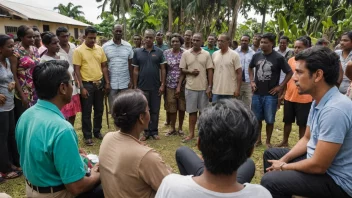Urban poverty remains one of the most pressing social issues of our time, affecting millions of people worldwide. As cities expand and populations grow, the challenges of urban poverty become more pronounced, with individuals and families facing barriers to education, healthcare, and stable employment. However, there are numerous initiatives and solutions being implemented to address these challenges. Here are some effective strategies that can help mitigate urban poverty and inspire individuals to take action.
1. Community-Based Initiatives
Community-based programs have shown tremendous success in combating urban poverty. By involving local residents in the decision-making process, these initiatives can effectively address the unique needs of the community. Examples include:
- Neighborhood Associations: These groups often work on projects that improve local infrastructure, provide resources for education, and create job opportunities.
- Microfinance Programs: Offering small loans to individuals in poverty can empower them to start their own businesses, thus fostering economic independence.
- Skill Development Workshops: Providing training in vocational skills helps individuals gain employment and improve their financial stability.
2. Education and Literacy Programs
Access to quality education is fundamental in breaking the cycle of poverty. Educational programs tailored for urban settings can lead to significant improvements in literacy rates and job readiness. Key components include:
- After-School Programs: These programs provide tutoring and mentorship to children from low-income families, helping them succeed academically.
- Adult Education Classes: Offering classes for adults who did not complete their education can enhance their job prospects and financial independence.
- Scholarship Opportunities: Partnering with local organizations to provide scholarships for higher education can open doors for many young people in urban areas.
3. Access to Healthcare Services
Health disparities are prevalent in urban areas, often exacerbated by poverty. Ensuring access to healthcare services is crucial for improving the overall wellbeing of impoverished communities. Strategies include:
- Mobile Health Clinics: These clinics bring essential health services directly to underserved neighborhoods, providing preventative care and education.
- Partnerships with Local Hospitals: Collaborating with hospitals can facilitate free or low-cost health services for low-income residents.
- Mental Health Resources: Addressing mental health is vital, as poverty can lead to increased stress and anxiety. Community centers can provide counseling and support.
4. Housing Stability Programs
Stable housing is a critical factor in alleviating urban poverty. Programs that aim to provide affordable housing and support services can make a significant difference. Some effective approaches include:
- Housing First Initiatives: This model prioritizes providing permanent housing to the homeless without preconditions, leading to improved health and employment outcomes.
- Rent Assistance Programs: Offering financial assistance to help families afford rent can prevent eviction and homelessness.
- Community Land Trusts: These nonprofit organizations can acquire land and create affordable housing options for low-income families.
5. Advocacy and Policy Change
Advocating for policy changes at local, state, and national levels is essential for addressing the root causes of urban poverty. Individuals can engage in advocacy by:
- Joining Local Advocacy Groups: Many organizations work to influence policy changes that benefit low-income communities, providing opportunities for individuals to get involved.
- Participating in Town Halls: Attending local government meetings allows citizens to voice their concerns and push for the needs of their communities.
- Educating Others: Raising awareness about urban poverty issues can galvanize support and lead to collective action for change.






